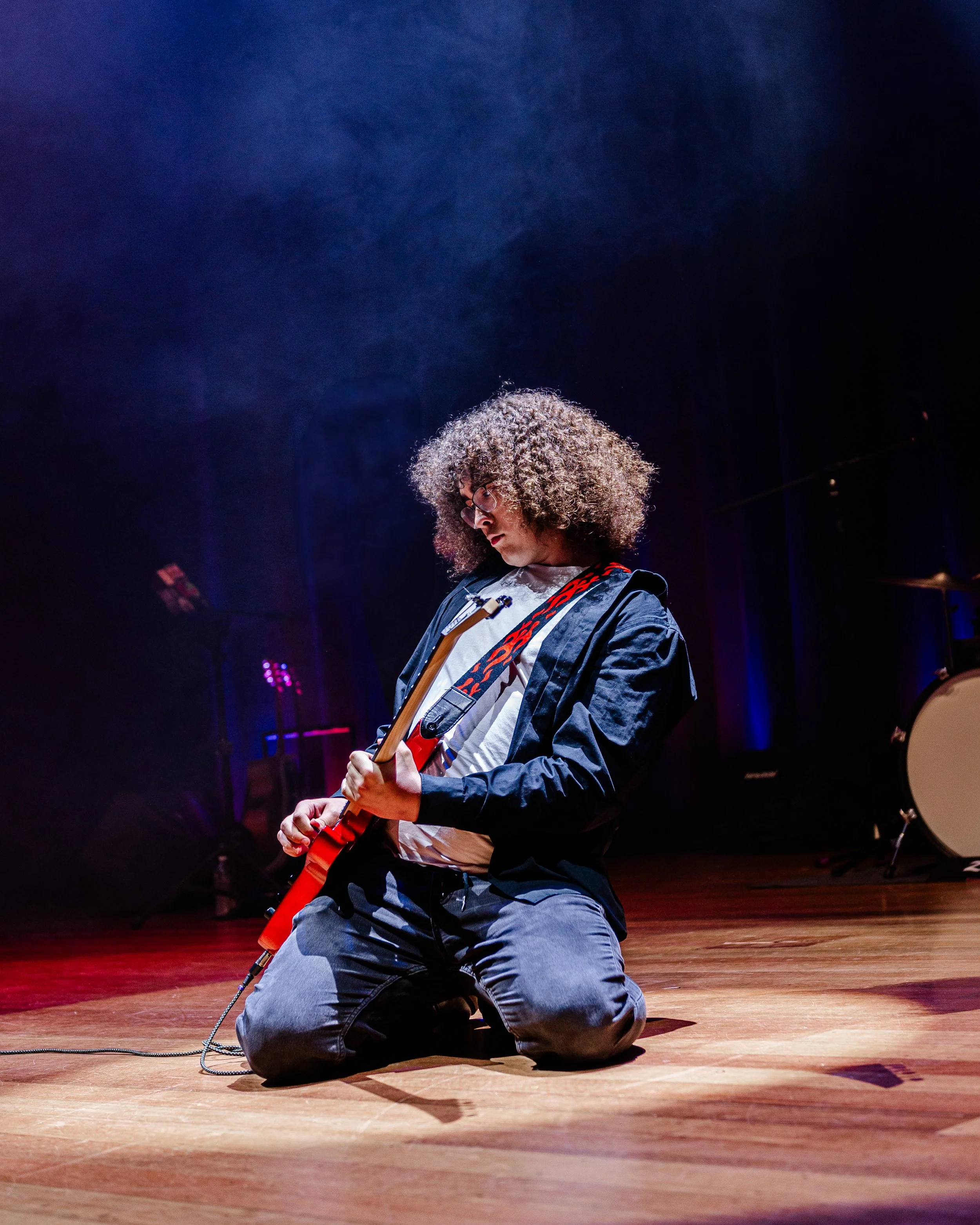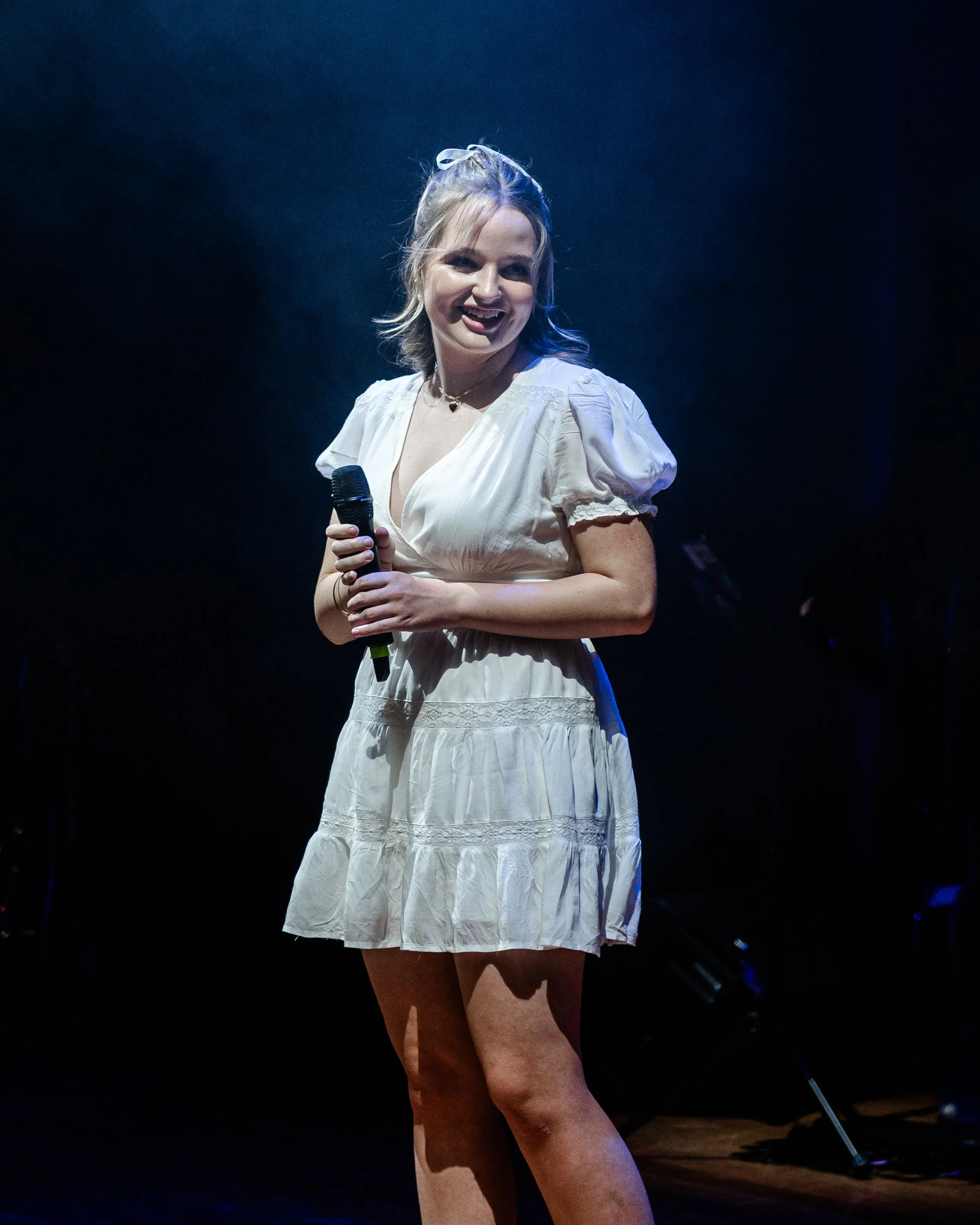How to Prepare for a Performance
Performing can feel like a HUGE step, especially if this is your first time… but don’t worry, we got you – here’s everything you need to know to feel SUPER prepared for your upcoming performance! 🕺
First of all… CONGRATS on taking up this opportunity! Putting yourself out there, challenging yourself and trying new things is the way we learn… even if you decide performing isn’t going to be your #1 priority – that’s growth! 💙
Before you start: Not sure if you want to perform just yet? Let’s explore it, together 🫶
Performing on stage doesn't have to be the goal for every musician… sometimes, it just doesn’t align with your goals, and that’s okay! Actually, sometimes performances can make it harder to achieve the goals you have set out for! Think about it, performances require so. much. preparation, time and dedication – usually focusing on just one song. So if your goal was to increase your repertoire, work on a specific technique or improve your songwriting – a performance might not be the best thing to help you reach your goals right now! 💗
Scared to even sign up? Sometimes, the nerves before a performance (or even when committing to the performance) can feel completely overwhelming. The best thing to establish with yourself is: do you even want to perform? Pretend you have no nerves – absolutely none – about this performance:
Does it still align with your goals?
It is going to help you grow as a musician? 🎼
Will you feel fulfilled and proud after you get off stage?
Does it sound like a fun experience? ✨
Have you wanted to do this for a while?
If your answer to ANY of these questions is yes, this sounds like it could be a REALLY cool experience for you. 👏
Performance jitters feeling a bit overwhelming? Check out this reel from SoundCheck Studios where Coach Anastasia explores her own journey with singing on stage!
Preparing for Your Performance: Choosing a Song 🎵
Okay, you’ve signed up, you’re excited (and a little nervous, but that’s okay) and it’s time to lock in the song you’re going to perform! 🎶
Depending on the performance, you might need to lock in your song much earlier than you expect – especially if someone is accompanying you, or you are performing with a band. This ensures that everyone can learn the song, and you have time to rehearse together before the actual performance.
There’s so many possible songs out there… how do you choose just one? If you don’t have a list of your repertoire (songs you can confidently sing all the way through), this might be a good time to make one! It doesn’t have to be anything fancy, just in the notes app on your phone or a playlist – so whenever you need to find a song to sing, you have a list right there in your pocket! 🎉
When you get up on stage, your performance usually drops from 100% (your total ability, the way you can sing or play in lessons or at home) to about 80%. This is totally normal, there’s so many new variables – bright lights, people in the audience and, of course, some nerves – so it’s important to choose a song that is going to work well at this 80% capacity.
Choosing a reallyyyyy tricky song might feel like a great idea, but once you get on stage, you’ll want something you feel confident performing, that you enjoy and is also fun!
You also might need to consider the theme or requirements for the event. There might be an overarching theme such as growth or individuality, or maybe it needs to be an original song that you’ve written yourself! Make sure to ask if there are any requirements you need to know before you make your choice – this will save you having to change your song choice last minute! 🤩
There is also often a time limit, so that everyone can get a chance to be on stage. This doesn’t mean you need to find a short song, you can cut a section from a longer song and just perform part of it. This is way more common than you might think, cutting a verse, a few choruses or an instrumental section means the song can really showcase your talents! If you need help cutting your track, ask your teacher to help you.
Preparing for Your Performance: Taking on Feedback 📝
Alright, you’ve signed up and chosen your song (yay!)... what now? ✨
If you’ve worked on the song before, check back in with your teacher…what were the main things you worked on with this piece?
If you’re play an instrument:
Can you play the piece up to speed confidently?
What technical aspects do you need to focus on, hand shape or position, rhythm or agility?
Is there a difficult section you need to work on?
If you’re singing:
Can you confidently remember the lyrics?
How are you going to use dynamics or technique to express the story of the song?
Are you using specific onsets and offsets?
You also might like to think about what you want to portray in your performance. Is this song dedicated to anyone special? Is it an emotional ballad or something super high-energy? This will help guide your performance. For example, if the song is really downhearted and emotional, this might not be the time to practice your knee slides 🎸
Summer Sounds with SoundCheck, 2024
Most of all, be confident in your hard work! It’s not just the time you’ve spent on this song, it’s the hours of practice over years of lessons. It’s the dedication and perseverance of always challenging yourself to be better… you got this!
Preparing for Your Performance: Setting Goals
It’s super easy to have HUGE goals and expectations for yourself, but this can lead to lots of self-criticism, not to mention nerves! Although you want to do the best you can, managing your expectations of your performance will help alleviate some nerves and help you celebrate your achievements!
A great way to encourage yourself to get up on stage is to set a super. simple. goal. It seems redundant, but keeping your expectations super reasonable helps you boost your confidence and have fun on stage.
Some AWESOME small goals could be:
Get up on stage 🙌
Get to the end of my performance and take a bow
Look out to the audience once during the performance 🎸
This way, once you get up on stage, you’ve already met the expectations you’ve set for yourself. Anything that happens after this is just a win! 😇
Need some more inspiration? Check out this reel from SoundCheck Studios that celebrates alllll kinds of growth!
On the Day: Balancing Nerves and Excitement
Congratulations… you made it to show day! No matter what happens, you’re a star in our eyes 🌟
Those nerves you feel before you get on stage… that actually means you care. We love to remind students that excitement and nervousness are just two sides of the same coin… think about it: heart racing, hands shaking, feeling fidgety, a million thoughts in your head, thinking about everything that might happen, and fast breathing – these are all symptoms of both nervousness and excitement!
Let’s have a look at the Yerkes-Dodson curve model from Healthline. This helps us to visualise the way our nerves can help us actually perform better 🤩
Yerkes-Dodson Law, Healthline
Having no nerves at all is going to decrease your attention, meaning you might make more mistakes. Feeling a little nervous puts you in the optimal arousal and performance zone, which just means your nerves are actually working to switch on your brain and solve any problems as they arise. On the other end of the curve, we have our high levels of anxiety, which causes your performance quality to take a dive as your brain is working in overdrive and distracting you from the performance.
Being nervous is normal, and it means you care. If you can keep your nerves in that optimal zone, you are going to totally smash your performance. Here’s some quick-fire tips to keep your nerves at bay:
Move your body, jump, skip, dance – anything to shake out the nerves 🕺
Take 5 deep breaths, in through your nose and out through your mouth
Find a quiet space and take a few minutes to yourself. Sometimes, we get caught up in everyone else’s nerves, take a moment to check in with yourself and how you *actually* feel 🥰
The 54321 method: Find 5 things you can see, 4 you can touch, 3 you can hear, 2 you can smell and 1 you can taste
Find a trusted person you can chat to… a friend, family member or coach
Try to say the alphabet backwards… or anything else that will distract your brain 💜
Feeling overwhelmed by the nerves? Reach out to someone you trust, this could be your music coach, parents, family members, friends or seek help online or over the phone with Beyond Blue.
On the Day: Celebrate Yourself 🥳
This final step is overlooked wayyyy too often. Performing is big. And you did it. You deserve to feel proud! 💗
Sometimes, as soon as it’s over, we already start criticising ourselves and making a plan for next time. Although self-reflection is important, don’t forget to take a moment just to feel PROUD of your achievement. There will be plenty of time to reflect and improve, and no one gets it 100% right all the time.
Mark it in your calendar if you need to – performance day:
10am – get ready and use grounding techniques 🤩
11am – get on stage and smash my performance 🎤
1pm – celebrate for the rest of the day, reflection and constructive criticism not allowed 🥳
Summer Sounds, 2024
We cannot wait to see you rock that stage at your next performance… chookas! 🎉



